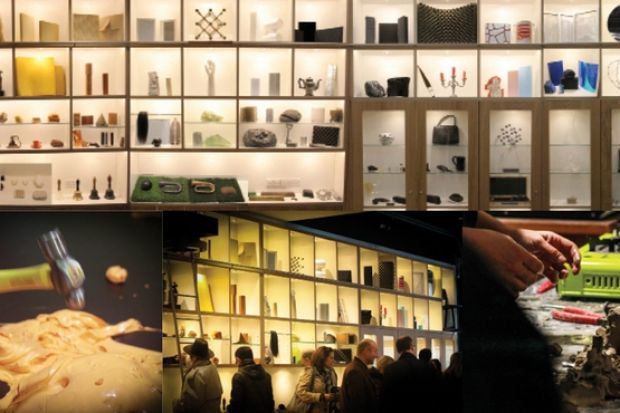Source: Ellie Doney/Samuel Annett/Zoe Laughlin
Cabinet of curiosities: a ‘multidisciplinary research club’ in a former loading bay at UCL is home to some 1,500 samples of creativity-inspiring substances
University College London’s new “multidisciplinary research club” brings together an astonishing range of unexpected objects that curator and creative director Zoe Laughlin hopes can “inspire curiosity and creativity”.
Among them are her own milk teeth, kept by her mother; a jar of fluorescent yellow paintball pellets; a sample of aerogel used in Nasa’s jet propulsion laboratory to catch star dust; steel spun out to the silky fineness of human hair; a piece of Bakelite once owned by somebody’s grandmother; and a chunk of Silly Putty.
There are also spoons made of different metals to test the theory that each gives food a slightly different taste and a collection of small cubes - one of Blu-Tack that someone had started to roll into a ball, another of white chocolate that had been nibbled by a mouse - showing how the edges and corners of different materials get chipped away.
All form part of the materials library that Dr Laughlin and her two fellow directors have been assembling since 2005. It had its genesis in her doctoral studies at King’s College London and was long kept hidden away in a basement there, although it was taken out occasionally for research, exhibitions and events. By 2010, she realised that the collection deserved much greater public prominence.
It now forms part of UCL’s Institute of Making, located in a former loading bay that still incorporates a crane to bring up kit from underground workshops. Core funding comes from UCL’s departments of engineering and of museums and public engagement. Unlike other libraries of materials, it is linked to a “MakeSpace” where members - anyone working at UCL who has paid the £20 registration fee and gone on an induction course - can come along and try things out. Dr Laughlin hopes to attract everyone from “people looking at material culture and the philosophy of matter to chemists creating a new kind of plastic”. There will also be monthly open days for the general public.
Martin Conreen, the institute’s director of making and a senior lecturer in design at Goldsmiths, University of London, has worked as a shoemaker, silversmith and set and furniture designer.
He said he was fascinated by “very common materials where we have only scratched the surface of their possible uses”, citing a centre in Lapland that makes buildings and instruments out of ice. He has himself donated some basalt thread, a safer alternative to fibreglass, to the collection.
Although the MakeSpace will be used by serious researchers, Mr Conreen hoped it would also be accessible to “staff with hobbies such as building bikes or musical instruments”.
For the centre’s third director Mark Miodownik, professor of materials and society at UCL, “manipulating things into something else is central to what makes us human. Everything in the library is at the start of a journey, about to be made into something else, whereas most things in museums are at the end of a journey. Much of the stuff here comes out of people’s bins, so we are elevating things we normally think of as crap. I hope innovation will flow out of bringing them together.”
Given that “the whole world is a materials library”, Dr Laughlin admitted that their “living, breathing collection” is inevitably selective. Although some of its 1,500 items come from cutting-edge material scientists bringing in a sample of an important new process, it is equally common for friends, family or colleagues to turn up with something and say: “Feel this, it’s just incredibly soft!”
Register to continue
Why register?
- Registration is free and only takes a moment
- Once registered, you can read 3 articles a month
- Sign up for our newsletter
Subscribe
Or subscribe for unlimited access to:
- Unlimited access to news, views, insights & reviews
- Digital editions
- Digital access to THE’s university and college rankings analysis
Already registered or a current subscriber? Login




